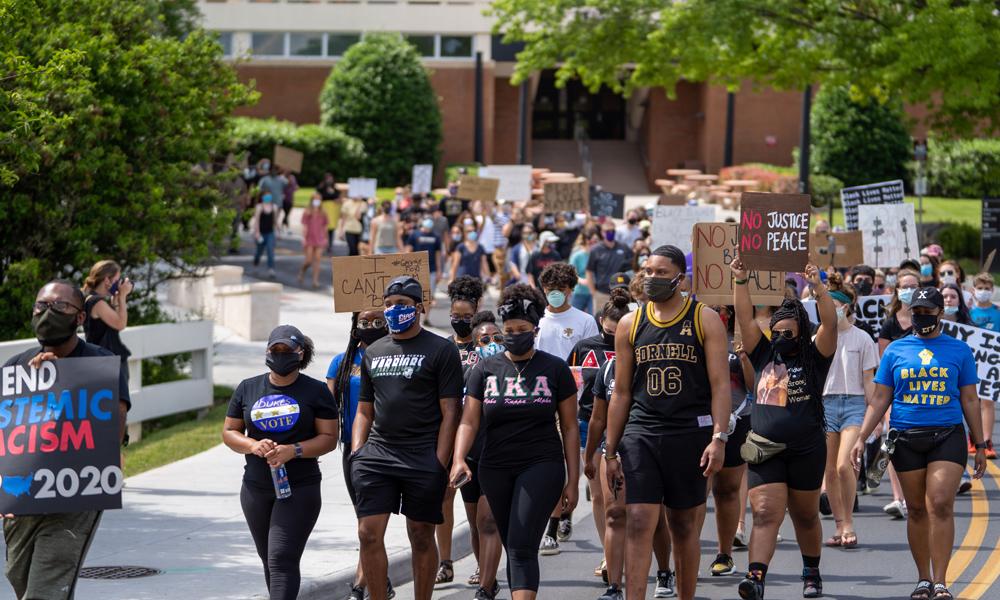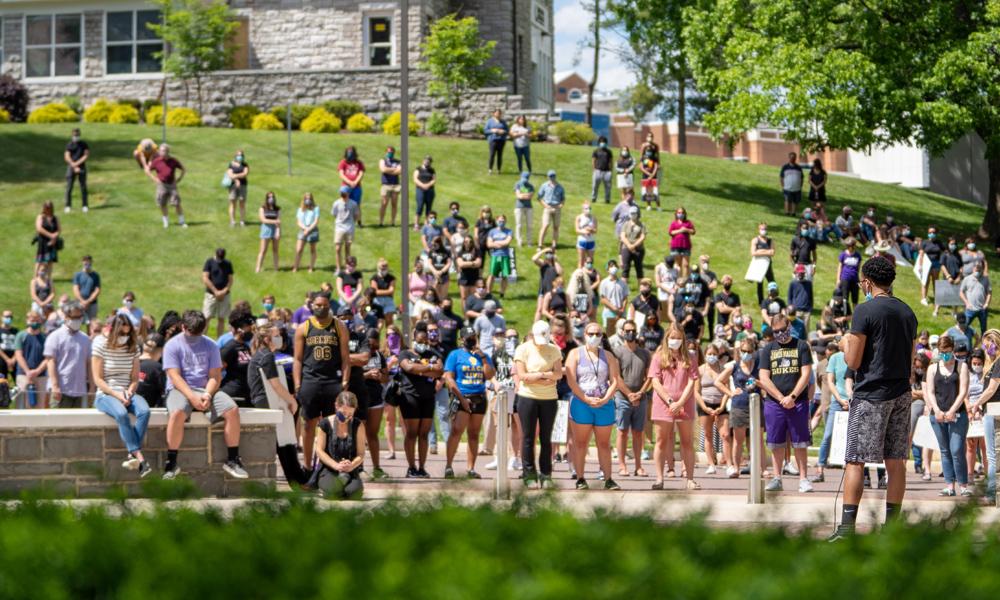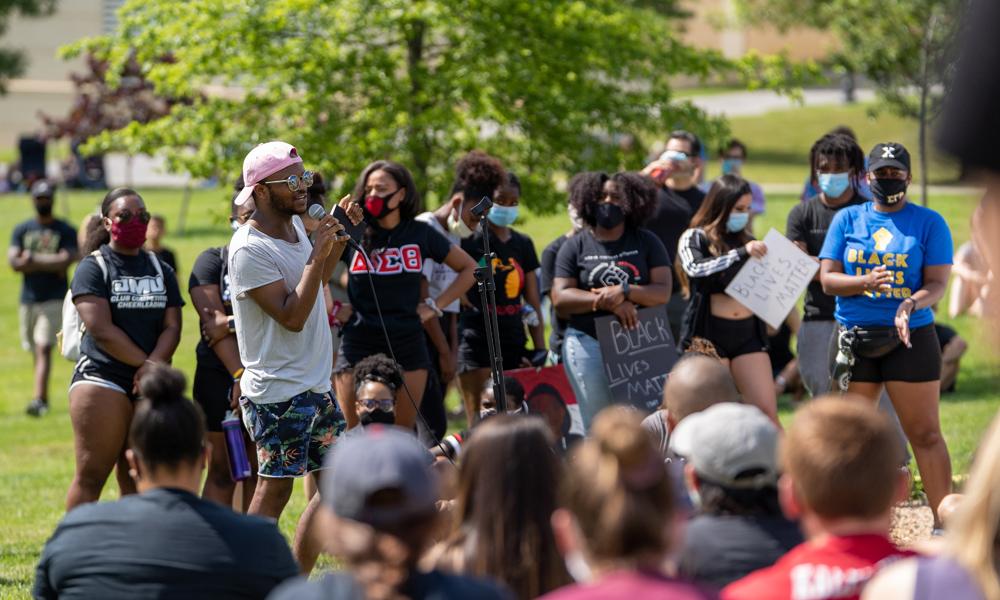‘March for Our Lives’ on JMU’s campus highlights racial injustices
Student-led march honors Black lives lost to systemic racism, police brutality
JMU News
SUMMARY: The JMU chapter of the NAACP organized “March for Our Lives” as a peaceful way of speaking out against racism in America.
By Khalil Garriott (’04)
A student-led march to highlight racial injustices and honor the Black lives lost as a result of systemic racism and police brutality took place June 12 on the campus of James Madison University.
Organized by the JMU chapter of the National Association for the Advancement of Colored People (NAACP), “March for Our Lives” was a peaceful way of speaking out against racism in America. The march began on Warner Commons and ended at Spirit Rock. An estimated 350 people attended. Face masks were required and participants were asked to maintain social distancing guidelines.
Before the march began, there was a moment of silence for Black people who have been murdered. The first 8 minutes and 46 seconds of the march were held in silence to celebrate Black lives lost. JMU students painted Spirit Rock black and added the words “Black Lives Matter.”
 |
(Photo by Justin Roth)
The group believes that without justice, there will be no peace.
“The reason behind holding this march is to bring attention … on a local level,” said senior Evaton Blackwood, who sits on the executive board of the NAACP chapter at JMU as parliamentarian. “Hopefully this will help to make progress. Seeing as I am African American, I felt this is something that’s necessary.”
The march was promoted via a Facebook event page, hosted by JMU Civic and Dukes Vote. Among the signs that students held were: “No Justice Without Peace,” “End Police Brutality,” “We Will Not Be Silenced,” “Teach Anti-Racism,” “Black Lives Matter,” “Why Is Ending Racism a Debate?” “Love Us Like You Love Our Culture,” “Black Lives Have Always Mattered,” “United We Stand,” “All Lives Can’t Matter Until Black Lives Do” and “Enough Is Enough.”
Senior Lori Friend said, “I decided to participate in this march because it’s something that affects my everyday life. I want to be able to look back in 20 years, when I have my own family, and say that I did something and I was a part of a movement that helped reshape the way that our society looks at every individual.
“I think it’s important to use your voice because if not you, then who else is gonna do it? Everybody always waits for somebody else to speak up. If you’re that person [who] really wants to see a change, you should be part of that driving force to make that change,” Friend said.
Venus Miller, assistant director for staff training and development in Career and Academic Planning, said the march showed the community “that there’s unity, we’re all part of this, and together we can actually make a difference.”
“I’m here today because as an African American female, I feel the pain of everything that has happened,” Miller said. “I spend days worrying about my family members, and seeing this again on TV is just retraumatizing not only myself, but the people I care about. Our voice is our breath; our voice gives us life. And if we’re not using it to speak out, then every time something like this happens, we’re just dying more and more. We have to use our voices.”
 |
(Photo by Justin Roth)
Founded in 1909, the NAACP is the nation’s oldest, largest and most widely recognized grassroots-based civil rights organization.
In addition to the march, the JMU chapter of the NAACP launched a social media series, “Living in Black America: A JMU NAACP Series,” to allow Black community members to voice their concerns and tell their stories of what it’s like to be a Black person living in America. Recognizing that change often is a multi-step process over time, student leaders designed the series to be a safe platform for everyone to use their voice. The group accepts all submissions from people who identify as Black, and you don’t have to be a JMU student to participate. People are welcome to share their stories of injustice and/or support their peers on the @JMUNAACP accounts on Instagram and Twitter.
“We need ALL students, staff, administrators and alumni to listen as these stories are being told,” the group posted. “Remain respectful, and support one another in solidarity.”
Earlier on June 12, JMU President Jonathan R. Alger sent an update to the university community on racial equity actions and campus building names. “Members of the JMU community have participated in discussions and actions near and far, insisting that change is needed and reminding us of the hard work ahead,” he wrote. Read Alger’s full message here.
Elsewhere on campus, JMU Libraries created a batch of e-resources themed “Antiracism in Action.” These resources include e-books, streaming movies, videos and articles available with a JMU login, as well as podcasts, videos, books and articles available to anyone.
|
"It's important for you to use your voice and speak out because there are those who couldn't speak out, even if they wanted to, because doing so meant certain death to them." — Evaton Blackwood, parliamentarian of JMU chapter of NAACP |
“Antiracism in Action” is meant to educate people about the past, understand the present, amplify and listen to the voices of those affected by racism, and confront the current and ongoing injustices in the United States.
On June 9, JMU Libraries released a statement titled “A Pledge: Self-Examination and Concrete Action in the JMU Libraries.” Read that statement here.
On June 11, JMU held a student town hall on racial injustice. Led by Heather Coltman, provost and senior vice president for academic affairs, and Tim Miller, vice president for student affairs, the town hall was held to help participants better understand and address racial injustice and inequities, with a recognition of this nation’s history of racism and violence perpetrated against Black communities and communities of color. Students were encouraged to share their personal experiences and suggestions surrounding inclusivity at JMU.
“It’s important for you to use your voice and speak out because there are those who couldn’t speak out, even if they wanted to, because doing so meant certain death to them,” said Blackwood, who added that he wants to be on the right side of history. “If I have a voice, I want to use it because some people can’t.”
